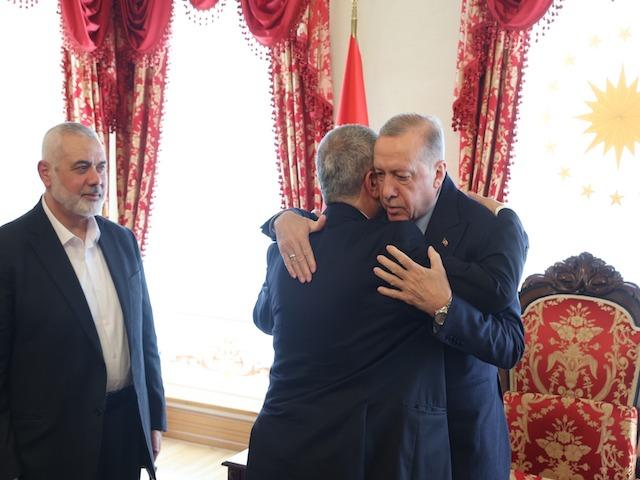Khaled Meshaal, the Hamas political leader living comfortably in Qatar with a net worth in the billions, delivered a recorded speech from Istanbul that reignited the dark memories of the Second Intifada. Meshaal, who operates far from the hardships faced by the Palestinian people, urged Arabs residing in Judea and Samaria (the West Bank) to return to the violent tactics that defined some of the bloodiest periods in recent history, specifically advocating for a resurgence of suicide bombings.
Meshaal's message was a clear call to arms: “Residents of the West Bank must return to attacks of self-sacrifice for Allah, initially in their own cities. It is necessary to open all fronts against the occupation.” This incendiary rhetoric marks an explicit push to escalate the conflict to unprecedented levels, reminiscent of the early 2000s when such attacks left hundreds dead and further divided the region.
BREAKING 🚨
— Open Source Intel (@Osint613) August 28, 2024
Hxmas leader Khaled Meshaal, in a recorded speech from Istanbul today, expressed that his organization intends to revive sui*cide attacks, stating that the only way to address the current situation is through an all-out struggle. @kaisos1987 pic.twitter.com/RnbrKSzTPx
A Call to War from the Safety of Istanbul
Broadcasting his message from the safety of Istanbul, Meshaal addressed his audience on Wednesday, urging immediate and practical actions in response to the ongoing conflict in Gaza. He framed these actions as part of the so-called "al-Aqsa Flood," referring to the October 7th attacks, and demanded that the broader Arab and Islamic world “return to the straight path of taking responsibility for Gaza.”
Hamas, he claimed, continues to fight as part of this campaign, positioning itself as a so-called defender of the Palestinian people. Meshaal boasted of the group's ability to "innovate" in the face of adversity, highlighting how Hamas not only manufactures its own weapons but also recruits new fighters even in the heat of battle. He painted a picture of a heroic struggle against an "aggressor," positioning Hamas as both the military and political savior of Gaza’s beleaguered population.
Recap.
— Shiri_Sabra (@sabra_the) August 26, 2024
Khaled Meshaal, a Hamas leader, once survived an Israeli assassination attempt in Jordan in 1997.
After the October 7 massacre, there will be no evading next time and he knows it.
All Hxmas leaders will not escape the inevitable.
Wall Street Journal: Dec 1, 2023 pic.twitter.com/8QVUAzwfpQ
Meshaal’s Dangerous Gambit and the Role of Erdoğan’s Turkey
Perhaps most troubling is Meshaal's glorification of the leadership of Yahya Sinwar, the current Hamas leader in Gaza, who remains a target of Israeli intelligence. According to Meshaal, Sinwar is the embodiment of resistance, despite his role in orchestrating brutal attacks against civilians. In a veiled threat, Meshaal suggested that any attempt to harm Sinwar would only further galvanize their cause.
In any Western nation, such a speech would likely result in Meshaal’s immediate arrest for incitement to violence and genocide. Yet, he continues to enjoy protection under the Islamist regime of Turkish President Recep Tayyip Erdoğan. Erdoğan, who has systematically transformed Turkey from a secular republic into an increasingly Islamic state, has long been accused of harboring ambitions to establish himself as the leader of a new Islamic caliphate. Under his rule, Turkey has cracked down on Kurdish populations, permitted waves of mass migration into Europe, and turned a blind eye to extremists operating within its borders—all while retaining membership in NATO and hosting critical Western military assets, including nuclear warheads.
Erdogan has been helping ISIS/AQ for years. He has denied this but is now openly using militias of "former" ISIS/AQ terrorists, exposing him for what he really is: a radical Islamist megalomaniac who wants to establish a caliphate with himself as the Caliph — the supreme ruler. pic.twitter.com/AQ5zb6Hp08
— Tulsi Gabbard 🌺 (@TulsiGabbard) October 30, 2019
Erdoğan’s shielding of figures like Meshaal underscores a broader geopolitical hypocrisy, where Turkey’s strategic value to the West often outweighs its blatant support for extremist elements. This paradox allows individuals like Meshaal to incite violence with impunity, knowing that their calls for bloodshed are unlikely to be met with any significant consequence.
Conclusion: Meshaal’s Escalation Strategy
Meshaal's inflammatory rhetoric is not just dangerous—it is a deliberate strategy to escalate the conflict in ways that could trigger wider regional instability. His call for mass casualty events is a stark reminder of the ruthlessness that defines Hamas’s approach, willing to sacrifice countless lives in pursuit of its extremist agenda. While Meshaal enjoys the privileges of his billionaire lifestyle in Qatar and Erdoğan’s protection in Turkey, he urges others to die for his cause, showing a cynical disregard for the very people he claims to represent.


